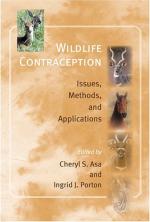|
This section contains 3,516 words (approx. 12 pages at 300 words per page) |

|
Birth control, or contraception, is the practice of preventing or reducing the probability of pregnancy without abstaining from sexual intercourse. In premodern texts references to the enhancement of fertility and birth outweigh references to their restriction, and the development of contemporary contraceptive technologies emerged from work on fertility enhancement. Today, however, one of the most common ways in which scientific and technological advances are experienced is through people's control of fertility and birth.
History of Birth Control
The desire to control fertility has always existed in tension with the desire to procreate and with social motives to preserve population sizes. Infanticide and abortifacients were used frequently in premodern and early modern societies to control the number of offspring. However, diverse contraceptive techniques also existed, including the natural rhythm method (avoiding intercourse during ovulation), coitus interruptus (withdrawal before ejaculation), coitus obstructus (using pressure to block the male...
|
This section contains 3,516 words (approx. 12 pages at 300 words per page) |

|


